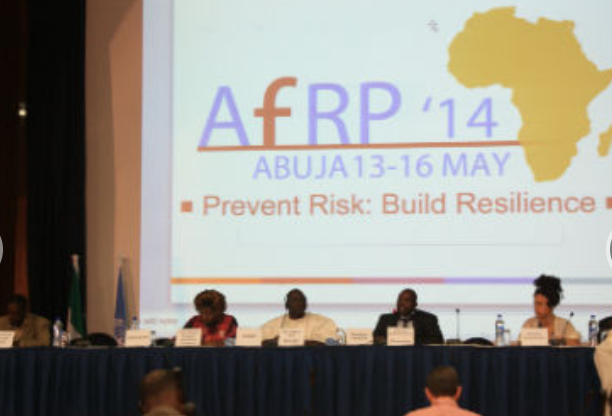
Advocates from the Red Cross and Red Crescent Movement joined governments and other civil society stakeholders to call for stronger laws on disaster risk reduction on the occasion of the 5th Africa Regional Platform for Disaster Risk Reduction in Abuja, Nigeria, from 12 to 16 May.
In the plenary session designed to develop the African vision for a post-2015 framework for risk reduction, Sierra Leone Red Cross Society Secretary General Hindovei Tommy presented some of the key findings from the recently released joint IFRC-UNDP study on legislation and risk reduction. This comparative study examined DRR legislation in 31 countries to identify what works, what does not, and what can be done to strengthen legal approaches to disaster risk. He underlined that the most important role for law in the field of DRR is to work as an enabling tool for ensuring DRR implementation at the local level, and that stronger DRR laws could enable institutions to be more effective by establishing clear mandates for DRR. He further highlighted that a main finding in the study is the current lack of mechanisms for community participation and involvement in early warning and risk mapping.
The ideas promoted in relation to DRR legislation resonated well with many participating government and civil society representatives. The chairman of the session, Mr. Abdou Sane, former Member of Parliament in Senegal and UNISDR Champion for DRR, reflected during the session that “it seems obvious that the next framework on DRR should focus on clarifying the legal framework for DRR”.
This same sentiment was expressed at a dedicated session organized on May 12 by the IFRC and UNDP to discuss a new tool they are developing namely a Checklist for lawmakers on DRR legislation. Drawing in part on the conclusions of the above-mentioned research, the IFRC and UNDP are holding a series of consultations to develop a simple checklist with questions that lawmakers should consider to ensure that their legislative frameworks for DRR are as effective as possible. It will be accompanied by a handbook containing more detailed information and best practices from various countries.
During the discussions, it became clear that there was a consensus among participants that such a checklist would be a useful tool for African lawmakers. It was further asserted that it could also be very helpful for civil society organizations and local communities who would like to engage in processes to develop DRR laws and regulations.
The important of disaster law emerged among the main advocacy messages of the Statement of Africa’s Contribution to the Post-2015 Framework for Disaster Risk Reduction, which emerged as a product of the Forum.
The statement lists as its first priority:
“Policy and appropriate legislation, including regulatory frameworks, have played a significant role in addressing disaster risks in many African countries; these processes should be enhanced, including through parliamentary forums at regional and national levels, and backed by strengthened institutional capacity to enforce legislation.”
Furthermore, the statement endorsed other key suggestions provided by the IFRC, namely the importance of public participation in policy development in order to better ensure that particular vulnerabilities of children, youth, women, elderly, and persons with disabilities, among others, are addressed.
The Africa Regional Platform recommended making the post-2015 framework more action oriented, and suggested this could be achieved by “allocating a proportion of public budgets for disaster risk reduction, with greater investment in disaster mitigation, preparedness and response”.